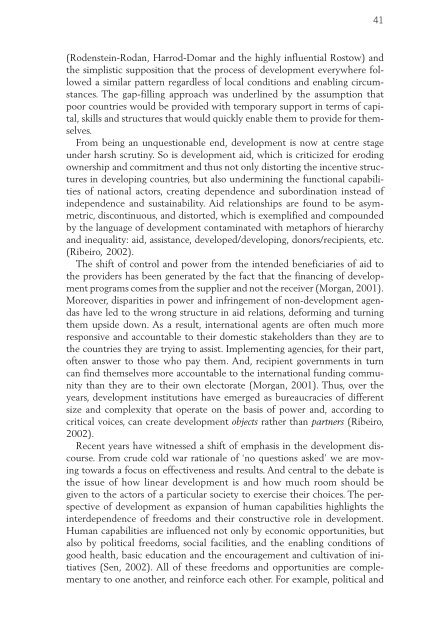Dialogue in Pursuit of Development - Are you looking for one of ...
Dialogue in Pursuit of Development - Are you looking for one of ...
Dialogue in Pursuit of Development - Are you looking for one of ...
You also want an ePaper? Increase the reach of your titles
YUMPU automatically turns print PDFs into web optimized ePapers that Google loves.
(Rodenste<strong>in</strong>-Rodan, Harrod-Domar and the highly <strong>in</strong>fluential Rostow) and<br />
the simplistic supposition that the process <strong>of</strong> development everywhere followed<br />
a similar pattern regardless <strong>of</strong> local conditions and enabl<strong>in</strong>g circumstances.<br />
The gap-fill<strong>in</strong>g approach was underl<strong>in</strong>ed by the assumption that<br />
poor countries would be provided with temporary support <strong>in</strong> terms <strong>of</strong> capital,<br />
skills and structures that would quickly enable them to provide <strong>for</strong> themselves.<br />
From be<strong>in</strong>g an unquestionable end, development is now at centre stage<br />
under harsh scrut<strong>in</strong>y. So is development aid, which is criticized <strong>for</strong> erod<strong>in</strong>g<br />
ownership and commitment and thus not only distort<strong>in</strong>g the <strong>in</strong>centive structures<br />
<strong>in</strong> develop<strong>in</strong>g countries, but also underm<strong>in</strong><strong>in</strong>g the functional capabilities<br />
<strong>of</strong> national actors, creat<strong>in</strong>g dependence and subord<strong>in</strong>ation <strong>in</strong>stead <strong>of</strong><br />
<strong>in</strong>dependence and susta<strong>in</strong>ability. Aid relationships are found to be asymmetric,<br />
discont<strong>in</strong>uous, and distorted, which is exemplified and compounded<br />
by the language <strong>of</strong> development contam<strong>in</strong>ated with metaphors <strong>of</strong> hierarchy<br />
and <strong>in</strong>equality: aid, assistance, developed/develop<strong>in</strong>g, donors/recipients, etc.<br />
(Ribeiro, 2002).<br />
The shift <strong>of</strong> control and power from the <strong>in</strong>tended beneficiaries <strong>of</strong> aid to<br />
the providers has been generated by the fact that the f<strong>in</strong>anc<strong>in</strong>g <strong>of</strong> development<br />
programs comes from the supplier and not the receiver (Morgan, 2001).<br />
Moreover, disparities <strong>in</strong> power and <strong>in</strong>fr<strong>in</strong>gement <strong>of</strong> non-development agendas<br />
have led to the wrong structure <strong>in</strong> aid relations, de<strong>for</strong>m<strong>in</strong>g and turn<strong>in</strong>g<br />
them upside down. As a result, <strong>in</strong>ternational agents are <strong>of</strong>ten much more<br />
responsive and accountable to their domestic stakeholders than they are to<br />
the countries they are try<strong>in</strong>g to assist. Implement<strong>in</strong>g agencies, <strong>for</strong> their part,<br />
<strong>of</strong>ten answer to those who pay them. And, recipient governments <strong>in</strong> turn<br />
can f<strong>in</strong>d themselves more accountable to the <strong>in</strong>ternational fund<strong>in</strong>g community<br />
than they are to their own electorate (Morgan, 2001). Thus, over the<br />
years, development <strong>in</strong>stitutions have emerged as bureaucracies <strong>of</strong> different<br />
size and complexity that operate on the basis <strong>of</strong> power and, accord<strong>in</strong>g to<br />
critical voices, can create development objects rather than partners (Ribeiro,<br />
2002).<br />
Recent years have witnessed a shift <strong>of</strong> emphasis <strong>in</strong> the development discourse.<br />
From crude cold war rationale <strong>of</strong> ‘no questions asked’ we are mov<strong>in</strong>g<br />
towards a focus on effectiveness and results. And central to the debate is<br />
the issue <strong>of</strong> how l<strong>in</strong>ear development is and how much room should be<br />
given to the actors <strong>of</strong> a particular society to exercise their choices. The perspective<br />
<strong>of</strong> development as expansion <strong>of</strong> human capabilities highlights the<br />
<strong>in</strong>terdependence <strong>of</strong> freedoms and their constructive role <strong>in</strong> development.<br />
Human capabilities are <strong>in</strong>fluenced not only by economic opportunities, but<br />
also by political freedoms, social facilities, and the enabl<strong>in</strong>g conditions <strong>of</strong><br />
good health, basic education and the encouragement and cultivation <strong>of</strong> <strong>in</strong>itiatives<br />
(Sen, 2002). All <strong>of</strong> these freedoms and opportunities are complementary<br />
to <strong>one</strong> another, and re<strong>in</strong><strong>for</strong>ce each other. For example, political and<br />
41

















![CynefinFramework final [Read-Only]](https://img.yumpu.com/19017304/1/190x135/cynefinframework-final-read-only.jpg?quality=85)